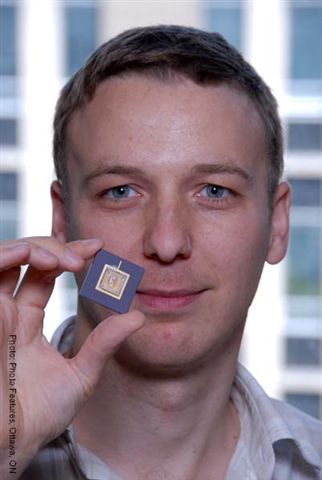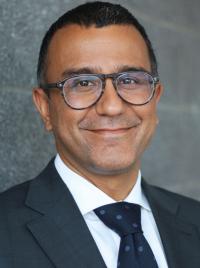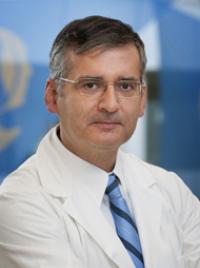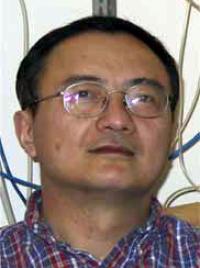Collaborators
Dr. William Anderson provides comprehensive treatments - such as deep brain stimulation (DBS) therapies - for movement disorders including, Parkinson's disease, essential tremor, and dystonia. He is also a member of the Epilepsy Surgery team, and performs both resectional procedures such as temporal lobectomy, diagnostic procedures such as implantation of monitoring grids and depth electrodes, and therapeutic neuromodulation using vagal nerve and cortical stimulation.
http://www.hopkinsmedicine.org/profiles/results/directory/profile/5467950/william-anderson
 Dr. Peter L. Carlen is a clinical neurologist, specializing in epilepsy and neurodegenerative diseases at the Toronto Western Hospital. He is a Professor in the Department of Medicine (Neurology), Physiology and the Institute of Biomaterial Engineering of the University of Toronto. He is also a Senior Scientist and the Scientific Division Head at the Krembil Research Institute. In his lab, they are developing nonlinear techniques for the identification different brain states including those associated with anesthesia and epilepsy. They also have several projects on cellular mechanisms of epilepsy, particularly the synchronizing role of electrotonic coupling via gap junctions.
Dr. Peter L. Carlen is a clinical neurologist, specializing in epilepsy and neurodegenerative diseases at the Toronto Western Hospital. He is a Professor in the Department of Medicine (Neurology), Physiology and the Institute of Biomaterial Engineering of the University of Toronto. He is also a Senior Scientist and the Scientific Division Head at the Krembil Research Institute. In his lab, they are developing nonlinear techniques for the identification different brain states including those associated with anesthesia and epilepsy. They also have several projects on cellular mechanisms of epilepsy, particularly the synchronizing role of electrotonic coupling via gap junctions.
https://www.uhnresearch.ca/researcher/peter-l-carlen
 Dr. Katherine Duncan competed her PhD at New York University, studying how hippocampal subfields contribute to memory formation and retrieval. She then moved uptown to Columbia University where she studied interactions between the hippocampus and dopaminergic system. She is currently an Assistant Professor in the Department of Psychology at the St. George campus.
Dr. Katherine Duncan competed her PhD at New York University, studying how hippocampal subfields contribute to memory formation and retrieval. She then moved uptown to Columbia University where she studied interactions between the hippocampus and dopaminergic system. She is currently an Assistant Professor in the Department of Psychology at the St. George campus.
 Professor Roman Genov received the B.S. degree in Electrical Engineering from Rochester Institute of Technology, NY in 1996 and the M.S.E. and Ph.D. degrees in Electrical and Computer Engineering from Johns Hopkins University, Baltimore, MD in 1998 and 2003 respectively. He has been on faculty of The Edward S. Rogers Sr. Department of Electrical & Computer Engineering at the University of Toronto since 2002. His research interests include analog and digital VLSI circuits, systems and algorithms for energy-efficient signal processing with applications to electrical, chemical and photonic sensory information acquisition, biosensor arrays, neural interfaces, parallel signal processing, adaptive computing for pattern recognition, and implantable and wearable biomedical electronics.
Professor Roman Genov received the B.S. degree in Electrical Engineering from Rochester Institute of Technology, NY in 1996 and the M.S.E. and Ph.D. degrees in Electrical and Computer Engineering from Johns Hopkins University, Baltimore, MD in 1998 and 2003 respectively. He has been on faculty of The Edward S. Rogers Sr. Department of Electrical & Computer Engineering at the University of Toronto since 2002. His research interests include analog and digital VLSI circuits, systems and algorithms for energy-efficient signal processing with applications to electrical, chemical and photonic sensory information acquisition, biosensor arrays, neural interfaces, parallel signal processing, adaptive computing for pattern recognition, and implantable and wearable biomedical electronics.
http://www.eecg.utoronto.ca/~roman/
Dr. Kari Hoffman is interested in the neural mechanisms underlying perception and memory formation. Her lab uses multi-channel recording and stimulation techniques applied during behavioral tasks, along with time- and frequency-domain analysis techniques. The goal is to understand neural phenomena such as the cellular basis of oscillatory brain activity and then to determine the role these phenomena may play in adaptive behaviors such as exploration and memory-guided exploitation of the environment.
http://perpllab.uit.yorku.ca/wordpress/
 Dr. Christopher Honey is an Assistant Professor in department of Psychological and Bran Sciences of Johns Hopkins University. In his lab, they study the spatial distribution of brain rhythms and how they change across cognitive states. His research interests include brain networks, temporal integration, short-term memory, neural oscillations, fMRI, ECoG, and computational modeling.
Dr. Christopher Honey is an Assistant Professor in department of Psychological and Bran Sciences of Johns Hopkins University. In his lab, they study the spatial distribution of brain rhythms and how they change across cognitive states. His research interests include brain networks, temporal integration, short-term memory, neural oscillations, fMRI, ECoG, and computational modeling.
 Dr. Suneil Kalia is a scientist at Krembil Research Institute and Assistant Professor in Neurosurgery at the University of Toronto. His research laboratory focuses on understanding molecular mechanisms of protein homeostasis in neurodegeneration and on establishing model systems to study protein function in Parkinson’s disease (PD). As a neurosurgeon his clinical focus is on the surgical management of movement disorders, particularly PD. He received his BSc at McGill University and his MD and PhD degrees from the University of Toronto. After obtaining his FRCS(C) in neurosurgery, he undertook subspecialty training in stereotactic and functional neurosurgery at the Toronto Western Hospital.
Dr. Suneil Kalia is a scientist at Krembil Research Institute and Assistant Professor in Neurosurgery at the University of Toronto. His research laboratory focuses on understanding molecular mechanisms of protein homeostasis in neurodegeneration and on establishing model systems to study protein function in Parkinson’s disease (PD). As a neurosurgeon his clinical focus is on the surgical management of movement disorders, particularly PD. He received his BSc at McGill University and his MD and PhD degrees from the University of Toronto. After obtaining his FRCS(C) in neurosurgery, he undertook subspecialty training in stereotactic and functional neurosurgery at the Toronto Western Hospital.
His team is actively working on developing novel biological therapies that are designed to slow or halt the progression of neurodegeneration in PD.
https://www.uhnresearch.ca/researcher/suneil-k-kalia
 Dr. Gabriel Kreiman is interested in the neuronal circuits and algorithms responsible for visual object recognition and memory formation. His lab combines neurophysiology, psychophysics and theoretical/computational modeling to understand the neuronal circuits, algorithms and computations performed by the visual system, using this knowledge to develop biophysically-inspired computational approaches to machine vision.
Dr. Gabriel Kreiman is interested in the neuronal circuits and algorithms responsible for visual object recognition and memory formation. His lab combines neurophysiology, psychophysics and theoretical/computational modeling to understand the neuronal circuits, algorithms and computations performed by the visual system, using this knowledge to develop biophysically-inspired computational approaches to machine vision.
http://klab.tch.harvard.edu/index.html#sthash.Hp0SaIQJ.dpbs
 Dr. Jeremie Lefebvre is an Assistant Professor in department of Mathematics at the University of Toronto and a scientist at the Krembil Research Institute . In his lab, they develop analysing tools to investigate neural circuits and their dynamics to understand the correlation between brain activity, neural coding and cognitive processes. A significant part of his work has been devoted to the characterization of synchronous dynamics in recurrent neural networks, and to the investigation of driven nonlinear systems. He also works in close collaborations with clinicians and experimentalists.
Dr. Jeremie Lefebvre is an Assistant Professor in department of Mathematics at the University of Toronto and a scientist at the Krembil Research Institute . In his lab, they develop analysing tools to investigate neural circuits and their dynamics to understand the correlation between brain activity, neural coding and cognitive processes. A significant part of his work has been devoted to the characterization of synchronous dynamics in recurrent neural networks, and to the investigation of driven nonlinear systems. He also works in close collaborations with clinicians and experimentalists.
https://sites.google.com/site/lefebvresynclab/
 Dr. Andres Lozano graduated from the University of Ottawa, Faculty of Medicine in 1983, and underwent Neurosurgical Training at McGill University. During his residency in Montreal, Dr. Lozano earned his Ph.D. in Experimental Medicine in 1989. Dr. Lozano joined the Neurosurgical Staff at the Toronto Western Hospital in 1991. He is currently Professor in the Department of Surgery, and inaugural Chair Holder of the Ron Tasker Chair in Stereotactic and Functional Neurosurgery at the University Health Network. He also holds a Tier I Canada Research Chair in Neuroscience. His main research and clinical interests lie in the field of the neurosurgical treatment of movement disorders and micro-electrode recordings of the human brain.
Dr. Andres Lozano graduated from the University of Ottawa, Faculty of Medicine in 1983, and underwent Neurosurgical Training at McGill University. During his residency in Montreal, Dr. Lozano earned his Ph.D. in Experimental Medicine in 1989. Dr. Lozano joined the Neurosurgical Staff at the Toronto Western Hospital in 1991. He is currently Professor in the Department of Surgery, and inaugural Chair Holder of the Ron Tasker Chair in Stereotactic and Functional Neurosurgery at the University Health Network. He also holds a Tier I Canada Research Chair in Neuroscience. His main research and clinical interests lie in the field of the neurosurgical treatment of movement disorders and micro-electrode recordings of the human brain.
http://neurosurgery.utoronto.ca/faculty/list/lozano.htm
 Dr. Milos Popovic is the Director of Research at the Toronto Rehabilitation Institute, Director of the Centre for Research in Advanced Neural Implant Applications (CRANIA), and the Toronto Rehab Chair in Spinal Cord Injury Research. He is also a Professor in the Institute of Biomaterials and Biomedical Engineering at the University of Toronto, as well as Senior Scientist and the Neural Engineering and Therapeutics Team Leader at the Toronto Rehabilitation Institute. His fileds of expertise include functional electrical stimulation, neurorehabilitation, neuroprosthetics, brain machine interfaces, modeling and control of linear and non-linear dynamic systems, robotics, power systems, signal processing and safety analysis.
Dr. Milos Popovic is the Director of Research at the Toronto Rehabilitation Institute, Director of the Centre for Research in Advanced Neural Implant Applications (CRANIA), and the Toronto Rehab Chair in Spinal Cord Injury Research. He is also a Professor in the Institute of Biomaterials and Biomedical Engineering at the University of Toronto, as well as Senior Scientist and the Neural Engineering and Therapeutics Team Leader at the Toronto Rehabilitation Institute. His fileds of expertise include functional electrical stimulation, neurorehabilitation, neuroprosthetics, brain machine interfaces, modeling and control of linear and non-linear dynamic systems, robotics, power systems, signal processing and safety analysis.
https://www.uhnresearch.ca/researcher/milos-popovic
 Dr. Elizabeth Pang obtained her PhD in Psychology from York University in 1997. She completed her post-doctoral fellowship at the Hospital For Sick Children where she tracked the developmental course of auditory event-related potentials associated with the processing of speech and non-speech stimuli. She is an Assistant Professor in the Department of Paediatrics, neurologist in the Division of Neurology of the Hospital for Sick Children, and an associate scientist at the Hospital for Sick Children, Neuroscience & Mental Health Program. Her research interests involve using auditory event-related potentials to examine diseases with dysfunctional auditory processing.
Dr. Elizabeth Pang obtained her PhD in Psychology from York University in 1997. She completed her post-doctoral fellowship at the Hospital For Sick Children where she tracked the developmental course of auditory event-related potentials associated with the processing of speech and non-speech stimuli. She is an Assistant Professor in the Department of Paediatrics, neurologist in the Division of Neurology of the Hospital for Sick Children, and an associate scientist at the Hospital for Sick Children, Neuroscience & Mental Health Program. Her research interests involve using auditory event-related potentials to examine diseases with dysfunctional auditory processing.
http://www.sickkids.ca/AboutSickKids/Directory/People/P/Elizabeth-Pang.html
 Dr. Ueli Rutishauser is an Associate Professor in Neuroscience in the Departments of Neurosurgery, Neurology and Biomedical Sciences at the Cedars-Sinai Medical Center and also holds a joint visiting appointment at the Division of Biology and Biological Engineering at the California Institute of Technology. Dr. Rutishauser studied computer science for his BS, and then received his PhD in Computation & Neural Systems from Caltech. After postdoctoral studies at the Max Planck Institute for Brain Research in Frankfurt, Germany, he started his own lab in 2012. In 2014, he was named a Next Generation Leader by the Allen Institute for Brain Science. The Rutishauser laboratory is investigating the neural mechanisms of learning, memory and decision-making at the level of single neurons in humans, using a combination of in vivo single-unit electrophysiology in humans, intracranial electrocorticography, eye tracking, behavior, and computational and theoretical approaches.
Dr. Ueli Rutishauser is an Associate Professor in Neuroscience in the Departments of Neurosurgery, Neurology and Biomedical Sciences at the Cedars-Sinai Medical Center and also holds a joint visiting appointment at the Division of Biology and Biological Engineering at the California Institute of Technology. Dr. Rutishauser studied computer science for his BS, and then received his PhD in Computation & Neural Systems from Caltech. After postdoctoral studies at the Max Planck Institute for Brain Research in Frankfurt, Germany, he started his own lab in 2012. In 2014, he was named a Next Generation Leader by the Allen Institute for Brain Science. The Rutishauser laboratory is investigating the neural mechanisms of learning, memory and decision-making at the level of single neurons in humans, using a combination of in vivo single-unit electrophysiology in humans, intracranial electrocorticography, eye tracking, behavior, and computational and theoretical approaches.
http://www.urut.ch/new/serendipity/
 Dr. Frances Skinner studied Applied Mathematics and Computer Science at the University of Waterloo (B.Math) and then did graduate studies at the University of Toronto in Biomedical Engineering (M.A.Sc., Ph.D.). She got involved in the world of Neuroscience during postdoctoral studies in Boston and California, and has been part of the burgeoning field of Computational Neuroscience ever since. The research in her lab focuses on mathematical model development and usage at the interface of theory, computation, and experiment. She is now a Senior Scientist at the Krembil Research Institute and a Full Professor at the University of Toronto. She is interested in determining neuronal and network mechanisms that contribute to brain functioning during normal and diseased states.
Dr. Frances Skinner studied Applied Mathematics and Computer Science at the University of Waterloo (B.Math) and then did graduate studies at the University of Toronto in Biomedical Engineering (M.A.Sc., Ph.D.). She got involved in the world of Neuroscience during postdoctoral studies in Boston and California, and has been part of the burgeoning field of Computational Neuroscience ever since. The research in her lab focuses on mathematical model development and usage at the interface of theory, computation, and experiment. She is now a Senior Scientist at the Krembil Research Institute and a Full Professor at the University of Toronto. She is interested in determining neuronal and network mechanisms that contribute to brain functioning during normal and diseased states.
 Dr. Jose Luis Perez Velazquez is a professor in the Department of Paediatrics, Institute of Medical Science, at the University of Toronto. He obtained his PhD from the Department of Molecular Physiology and Biophysics at Baylor College of Medicine in 1992. He was granted a Doctorate in Chemistry by the Spanish Ministry of Culture in 1997. He has worked in Toronto since 1992, initially at Toronto Western Hospital, and at The Hospital for Sick Children since 2001. His research interests lies in seeking an understanding of the relation between brain function and behaviour.One of his key research themes is the investigation of the patterns of coordinated activity in brain networks, associated with some pathologies and cognitive functions.
Dr. Jose Luis Perez Velazquez is a professor in the Department of Paediatrics, Institute of Medical Science, at the University of Toronto. He obtained his PhD from the Department of Molecular Physiology and Biophysics at Baylor College of Medicine in 1992. He was granted a Doctorate in Chemistry by the Spanish Ministry of Culture in 1997. He has worked in Toronto since 1992, initially at Toronto Western Hospital, and at The Hospital for Sick Children since 2001. His research interests lies in seeking an understanding of the relation between brain function and behaviour.One of his key research themes is the investigation of the patterns of coordinated activity in brain networks, associated with some pathologies and cognitive functions.
http://www.neuroscience.utoronto.ca/faculty/list/perezvelazquez.htm
 Dr. Thilo Womelsdorf is affiliated with the Department of Biology, and with graduate programs in Cognitive Science, Computer Science and Engineering, and Brain, Behavior and Cognitive Science (Psychology). He is also member of Centre for Vision Research, the Neuroscience Diploma Program at York University, the Systems & Computational Neuroscience Speaker Series, and the the Canadian Action and Perception Network. In his lab, they investigate the neuronal implementation, the algorithms, and the cellular machinery that precede choices. His lab also strives to understand how neuronal circuits implement control processes governing human’s attention.
Dr. Thilo Womelsdorf is affiliated with the Department of Biology, and with graduate programs in Cognitive Science, Computer Science and Engineering, and Brain, Behavior and Cognitive Science (Psychology). He is also member of Centre for Vision Research, the Neuroscience Diploma Program at York University, the Systems & Computational Neuroscience Speaker Series, and the the Canadian Action and Perception Network. In his lab, they investigate the neuronal implementation, the algorithms, and the cellular machinery that precede choices. His lab also strives to understand how neuronal circuits implement control processes governing human’s attention.
http://attentionlab.ca/doku.php?id=start
 Dr. Richard Arnold Wennberg is a Professor in the Division of Neurology at the University of Toronto, and a neurologist in the Toronto Western Hospital. He is also a Clinical Researcher at the Krembil Research Institute. His current research interests lie in the fields of electroencephalography(EEG), Magnetoencephalography (MEG), epilepsy, epilepsy surgery, concussion, mild traumatic brain injury behavioural and cognitive neurology, and consciousness studies. His main focus is to explore the neurophysiological mechanisms linking brain function and behaviour and to improve current understanding of the biophysical bases for clinical neurophysiology.
Dr. Richard Arnold Wennberg is a Professor in the Division of Neurology at the University of Toronto, and a neurologist in the Toronto Western Hospital. He is also a Clinical Researcher at the Krembil Research Institute. His current research interests lie in the fields of electroencephalography(EEG), Magnetoencephalography (MEG), epilepsy, epilepsy surgery, concussion, mild traumatic brain injury behavioural and cognitive neurology, and consciousness studies. His main focus is to explore the neurophysiological mechanisms linking brain function and behaviour and to improve current understanding of the biophysical bases for clinical neurophysiology.
https://www.uhnresearch.ca/researcher/richard-wennberg
 Dr. Liang Zhang is an Associate Professor in the Division of Neurology at the University of Toronto. He is also an affiliate scientists at the Krembil Research Institute. His long-term goal in research is to examine the cellular and local circuitry mechanisms of brain EEG oscillations. His focus is on the hippocampus and related temporal lobe structures. In his lab, they use the rodent models in vivo and in vitro to explore intrinsic network oscillations of the hippocampus and temporal lobe circuitry under physiological conditions and following brain ischemia and seizures.
Dr. Liang Zhang is an Associate Professor in the Division of Neurology at the University of Toronto. He is also an affiliate scientists at the Krembil Research Institute. His long-term goal in research is to examine the cellular and local circuitry mechanisms of brain EEG oscillations. His focus is on the hippocampus and related temporal lobe structures. In his lab, they use the rodent models in vivo and in vitro to explore intrinsic network oscillations of the hippocampus and temporal lobe circuitry under physiological conditions and following brain ischemia and seizures.
https://www.uhnresearch.ca/researcher/liang-zhang
Industrial Partners
 Synaptive Medical is a Toronto-based medical device and technology company focused on delivering revolutionary technology to the neurosurgical space. Synaptive’s Reveal device is an ex vivo tissue analysis system that generates rich chemical and structural information of a sample via its integrated Raman spectroscopy and Polarization Sensitive Optical Coherence Tomography technology. Reveal is designed for use in the operating room at Toronto Western Hospital to analyze freshly excised ex vivo brain tissue from patients. Reveal is a novel intraoperative brain imaging tool that may potentially allow surgeons to intraoperatively distinguish healthy from tumorous brain tissues in situ, significantly enhancing extent of resection while preserving healthy brain tissues, ultimately providing an improved surgical outcome of brain tumor patients.
Synaptive Medical is a Toronto-based medical device and technology company focused on delivering revolutionary technology to the neurosurgical space. Synaptive’s Reveal device is an ex vivo tissue analysis system that generates rich chemical and structural information of a sample via its integrated Raman spectroscopy and Polarization Sensitive Optical Coherence Tomography technology. Reveal is designed for use in the operating room at Toronto Western Hospital to analyze freshly excised ex vivo brain tissue from patients. Reveal is a novel intraoperative brain imaging tool that may potentially allow surgeons to intraoperatively distinguish healthy from tumorous brain tissues in situ, significantly enhancing extent of resection while preserving healthy brain tissues, ultimately providing an improved surgical outcome of brain tumor patients.
https://www.synaptivemedical.com/


